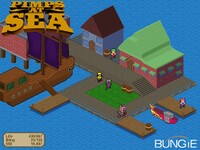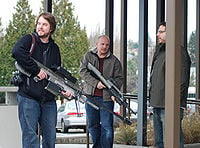Bungie: Difference between revisions
From Halopedia, the Halo wiki
No edit summary |
(→Trivia: Reworking, and adding {fact}. I mean, 'Bungie's real name is Arete Seven'? It's not like they're a secret organization or anything! It would be insanely pointless to have a secret name.) |
||
| Line 115: | Line 115: | ||
==Trivia== | ==Trivia== | ||
[[Image:BungieStaff.jpg]] | [[Image:BungieStaff.jpg|Bungie staff]] | ||
*Over at bungie.net there is a forum investigating 'Arete Seven', which is quite possibly Bungie's real name, while Bungie is just their public name. In fact, if you search Arete Seven on halo.wikia.com, it will take you to this very page. | *Over at bungie.net, there is a forum investigating 'Arete Seven', which is quite possibly Bungie's real name{{fact}}, while Bungie is just their public name. In fact, if you search Arete Seven on halo.wikia.com, it will take you to this very page. | ||
* | *Bungie employees have said that "Bungie" is a punchline to a really dirty joke as an excuse to get out of conversations before. At one time [[Alex Seropian]] was quoted saying it's named Bungie because it sounded fun<ref>[http://marathon.bungie.org/story/scrapbook.html The Marathon Scrapbook]</ref>. | ||
*Bungie's favorite number is [[seven]]. | *Bungie's favorite number is [[seven]]. | ||
* | **Bungie's [[seven]] steps to world domination is a reference to Bungie's favorite number. | ||
*Bungie's [[seven]] steps to world domination is a reference to Bungie's favorite number. | |||
*Bungie's Lead Producer is [[Jason Jones]]. | *Bungie's Lead Producer is [[Jason Jones]]. | ||
Revision as of 22:16, February 7, 2009
Template:Ratings Template:Realworld Template:SeeWikipedia
- "Even through the Microsoft acquisition, Bungie’s purpose is not to make money for Microsoft and support the platform. Instead, Bungie’s purpose is to make great stuff like video games."
- — Chris Butcher[1]
Bungie LLC, formerly Bungie Software Products Corporation prior to its emancipation from Microsoft, is a video game developer founded in 1991.
For much of the 1990s they developed a series of increasingly technically detailed first-person shooter (FPS) games for the Macintosh, the most famous being the Marathon series, following this with the acclaimed Myth tactical-combat series for both the Mac and Windows. Bungie games were particularly well-loved by players due to their complex back stories which often left more mysteries unexplained than revealed.

In 1999 they announced that their next product was a return to the FPS genre, with a world-beating physics and AI system, to be known as Halo and to be released at the same time on both the Mac and also Windows. On June 19, 2000, Microsoft announced that they had acquired Bungie Software and that Bungie would become a part of the Microsoft Game Division (subsequently renamed Microsoft Game Studios) under the name Bungie Studios. The original versions were soon delayed and the game was re-purposed for the Xbox, with the Mac and Windows versions only shipping two years later when it was no longer the renowned product it would have been in about late 2000. The Xbox version of Halo received the Game of the Year and Console Game of the Year awards for 2002 from the Academy of Interactive Arts & Sciences, is known as a system seller and as of 2004 is still a videogame bestseller. Halo: Combat Evolved has been one of the most critically acclaimed games over the last three years, and its sequel Halo 2 has been called the 'most anticipated game of all time' by IGN Xbox.
On October 5, 2007, Bungie and Microsoft announced an end to their partnership, effectively making Bungie an independent company once again, now titled Bungie LLC (limited liability corporation). The Halo Intellectual Property (IP) remains with Microsoft. Bungie employees have mentioned that there have been 'few noticeable changes' after the split.
Their offices were originally based in Chicago, Illinois. After Microsoft's acquisition, they moved into the Microsoft Campus at Redmond, Washington. They have more recently moved to Kirkland, Washington.
While not directly behind the program, Bungie oversaw and 'signed off' on the I Love Bees puzzle, named after the address of the 'hacked' bee-keeping website around which the game revolves briefly appeared in the Halo 2 theatrical trailer. They provided the I Love Bees designers with the Halo Story Bible, allowing the story to fit to Bungie's specifics.
Bungie Mythos
Bungie, like many production companies, puts references to older games in newer games. Unlike others, many of these references hint or imply that a great deal of Bungie's games operate in similar or identical universes. Most well known of this is the connection between the Marathon universe and the Halo universe, which share a great deal of similar names and themes (see List of Marathon references in Halo).
While most believed that Bungie would never add a direct connection between these two games (just as they did not for Marathon and Pathways into Darkness), its interesting to note that the I Love Bees puzzle did add a substantial connection between the Marathon universe and the Halo universe: Rampancy can happen to AIs in both universes.
Another interesting fact about Bungie is their use of the number seven. Many of these are more obvious than others, including 343 Guilty Spark (7 x 7 x 7 = 343), Pfhor Battle Group 7, and their official fan club, the 7th Column, but some of these are amusingly subtle: the Marathon colony ship was a hollowed out Deimos - first discovered in 1877 and first photographed in 1977. See also List of "Seven" references in Halo.
Bungie as a company has developed its own complex and diverse mythology in addition to that in their games. Several of these include:
- The 7-Steps Plan for World Domination.
- The snack food Tijuana Mama.
- The decapitated head of a dog named Ling-Ling (Step Five in the World Domination plan).
- The entity that resides in their server is named Disembodied Soul.
- The chronically drunk and aggressive webmaster of Bungie.net (Known for dressing as a gorilla with a floppy yellow cowboy hat, as well as disappearing for months on "HTML research missions" and answering the E-Mails of grammatically impaired fans).
- A cheap absorbent toy fish called the Soffish.
- The Cup, the prize at the Bungie Winter Pentathlon (A tradition has emerged that the losing team, out of envy, steals the cup rather than let the winning team touch it. In fact, several Bungie employees doubt the actual existence of The Cup, as it has been stolen and hidden so many times they have never laid eyes on it).
- Bungie Day, a mock holiday Bungie created to celebrate the number seven.
Bungie West
In 1997, Bungie Studios established Bungie West, a studio in California. However, the studio didn't last long and was shut down in 2000. Bungie West's only game was Oni.
Offshoot Companies
Many of Bungie's employees have left the company to form their own studios. Double Aught was a short-lived company comprised of several former Bungie team members, founded by Greg Kirkpatrick. The company helped Bungie develop Marathon: Infinity, the last game in the Marathon series. [2]
Wideload Games, creator of Stubbs the Zombie in "Rebel Without a Pulse", is another company that came from Bungie; It is headed by one of the two Bungie founders, Alex Seropian, and 7 out of the 11 employees previously worked at Bungie. Other companies include Giant Bite, founded by Hamilton Chu (former lead producer of Bungie Studios), and Michal Evans (former Bungie programmer), [3] and Certain Affinity. Founded by Max Hoberman (the multiplayer design lead for Halo 2 and Halo 3), the team of nine includes former Bungie employees David Bowman & Chad Armstrong (who later returned to Bungie) as well as folks from other developers. It collaborated with Bungie in releasing the last two maps for Halo 2.[4]
Bungie Games
- Gnop! (1990)
- Operation Desert Storm (1991)
- Minotaur: The Labyrinths of Crete (1992)
- Pathways into Darkness (1993)
- Marathon (1994)
- Marathon 2: Durandal (1995)
- Abuse (Macintosh port) (1996)
- Marathon Infinity (1996)
- Weekend Warrior (publisher) (1997)
- Myth: The Fallen Lords (1997)
- Myth II: Soulblighter (1998)
- Oni (2001)
- Halo: Combat Evolved (2001)
- Halo 2 (2004)
- Halo 3 (2007)
- Pimps at Sea (joke)
- Halo 3: ODST (2009)
Two other games are also under development. Of the three projects that Bungie is working on, not all of them are Halo related.[5]
Bungie Employees
- Main article: [[:
- Category:Bungie Staff|
- Category:Bungie Staff]]
Notable Bungie employees include:
- Martin O'Donnell - Music and Soundtrack
- Jason Jones - Project Lead, Co-Founder
- Robert McLees - Weapons Designer and Graphics
- Marcus R. Lehto
- Pete Parsons
- Alexander Seropian - Co-Founder, Former
- Matt Soell - Former
- Joseph Staten - Writer/Designer
- Shi Kai Wang - 3D Designer
- Christian Allen
- Jay Weinland
- Tyson Green - Multiplayer Design
- John Butkus - Animator (Former Byngie Employee)
- Brian Jarrard - Community Lead
- Lars Bakken - Multiplayer Designer
- Jon Cable - Sandbox Programmer
- Bob Glessner - Tools Programmer
- Dan Miller - Campaign/Multiplayer Level Designer
- Joseph Tung- Multiplayer Producer
- Jon Cable- Multiplayer Engineer
- Tom Doyle- Weapons Designer
- Luke Smith - Community Lead
- Luke Timmins - Programmer
- Charlie Gough
- Chris Butcher - Senior Engineer
- Christopher P. Carney - Artist
- Allen Murray- Producer
- Jason Sussman
- Raj
- Seth Gibson
- Justin Hayward
- Bill O'Brien
- CJ Cowan
- Frank Capezzuto 3
Bungie Acknowledgments of Halopedia
Bungie has mentioned Halopedia twice in it's Blogs. One saying it is "The definitive source for all Halo 3 Information" and the other being the 2008 Bungie Day blog claiming you could find out more on their 7 obsession here.
Trivia
- Over at bungie.net, there is a forum investigating 'Arete Seven', which is quite possibly Bungie's real nameTemplate:Fact, while Bungie is just their public name. In fact, if you search Arete Seven on halo.wikia.com, it will take you to this very page.
- Bungie employees have said that "Bungie" is a punchline to a really dirty joke as an excuse to get out of conversations before. At one time Alex Seropian was quoted saying it's named Bungie because it sounded fun[6].
- Bungie's favorite number is seven.
- Bungie's seven steps to world domination is a reference to Bungie's favorite number.
- Bungie's Lead Producer is Jason Jones.
External Links
- Meet the Team
- Official homepage.
- A Wiki dedicated to Bungie, Bungiepedia.
- Official Halo 2/Halo 3 Stats page.
- Bungie's multiplayer-gaming portal.
- Unofficial Bungie fan site.
- Marathon source-code site.
- Marathon 2 under the GPL
- Bungie bought by Microsoft.
- Microsoft to Acquire Bungie Software press release.
- Microsoft unhappy with Bungie's use of Linux on servers.
- Source code for Myth 2's server released.
- Download the Marathon Trilogy for free, with Bungie's blessings.
- More Bungie trivia than you can shake a stick at.
- A developer's video tour of Bungie Studios.



